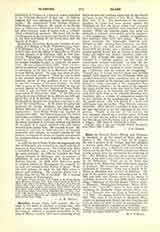

Blandina, Saint, virgin and martyr.—She belongs to the band of martyrs of Lyons who, after some of their number had endured the most frightful tortures, suffered a glorious martyrdom in the reign of Marcus Aurelius (177) and concerning whose death we have the touching report sent by the Church of Lyons to the Churches of Asia Minor (Eusebius, Hist. eccl., V, 2). The fanaticism of the heathen populace in Lyons had been excited against the Christians so that the latter, when they ventured to show themselves publicly, were harassed and ill-treated. While the imperial legate was away the chiliarch, a military commander, and the duumvir, a civil magistrate, threw a number of Christians, who confessed their faith, into prison. When the legate returned, the imprisoned believers were brought to trial. Among these Christians was Blandina, a slave, who had been taken into custody along with her master, also a Christian. Her companions greatly feared that on account of her bodily frailty she might not remain steadfast under torture. But although the legate caused her to be tortured in a horrible manner, so that even the executioners became exhausted “as they did not know what more they could do to her”, still she remained faithful and repeated to every question “I am a Christian and we commit no wrongdoing.” Through fear of torture heathen slaves had testified against their masters that the Christians when assembled committed those scandalous acts of which they were accused by the heathen mob, and the legate desired to wring confession of this misconduct from the Christian prisoners. In his report to the emperor the legate stated that those who held to their Christian belief were to be executed and those who denied their faith were to be released; Blandina was, therefore, with a number of companions subjected to new tortures in the amphitheatre at the time of the public games. She was bound to a stake and wild beasts were set on her. They did not, however, touch her. After this for a number of days she was led into the arena to see the sufferings of her companions. Finally, as the last of the martyrs, she was scourged, placed on a red-hot grate, enclosed in a net and thrown before a wild steer who tossed her into the air with his horns, and at last killed with a dagger. Her feast is celebrated June 2.
J. P. KIRSCH

